Related Research Articles

Abertillery is a town and a community of the Ebbw Fach valley in the historic county of Monmouthshire, Wales. Following local government reorganisation it became part of the Blaenau Gwent County Borough administrative area.
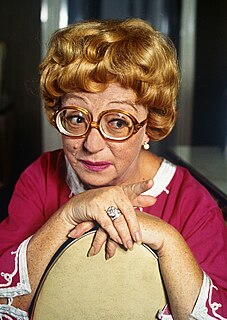
Dame Thora Hird was an English actress and comedian, presenter and writer. In a career spanning over 70 years, she appeared in more than 100 film and television roles, becoming a household name and a British institution.
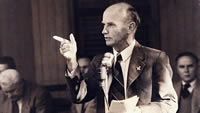
Frederick Woolnough Paterson was an Australian politician, activist, unionist and lawyer. He is the only representative of the Communist Party of Australia to be elected to an Australian parliament.

The Radcliffe Infirmary was a hospital in central north Oxford, England, located at the southern end of Woodstock Road on the western side, backing onto Walton Street.
Somerville Hastings, FRCS was a British surgeon and Labour Party politician.
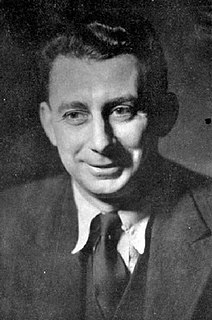
Ralph Winston Fox was a British revolutionary, journalist, novelist, and historian, best remembered as a biographer of Lenin and Genghis Khan. Fox was one of the best-known members of the Communist Party of Great Britain (CPGB) to be killed in Spain fighting against the Nationalists in the Spanish Civil War.

Felicia Mary Browne was an English artist and leftist. She was the first British volunteer to die in the Spanish Civil War. Her body was not recovered.
The National Hunger March of September–October 1932 was the largest of a series of hunger marches in Britain in the 1920s and 1930s.
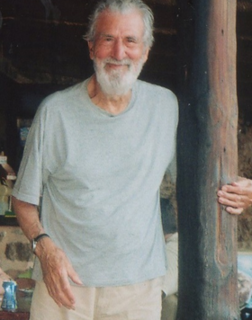
Vic Allen was a British communist, human rights activist, political prisoner, sociologist, historian, economist and emeritus professor at the University of Leeds who worked closely with British trade unions, and was considered a key player in the resistance against Apartheid in South African. He was also known for being a key activist within the Communist Party of Great Britain (CPGB), and for spending his life supporting the South African National Union of Mineworkers (NUM).
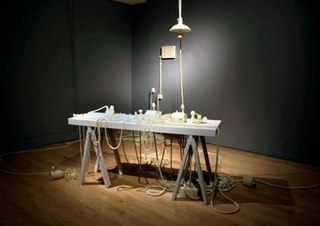
Jeanne Silverthorne is an American sculptor, known for cast-rubber sculptures and installations that explore the artist's studio as a metaphor for artistic practice, the human body and psyche, and mortality. She gained prominence in New York City in the 1990s, as one of several material-focused sculptors who critiqued the austere, male-dominated Minimalist movement by embracing humble, unorthodox media and hand-made, personal and ephemeral qualities championed by artists such as Eva Hesse and Louise Bourgeois. She treats the studio as a physical and conceptual site to be excavated, documented and inventoried, examining in the words of Sculpture's Jan Riley "the end of studio arts … and the impossibility of this mode of expression regaining its former creative validity and vitality in today’s world." Art in America critic Raphael Rubinstein wrote that, like the late studio paintings of Philip Guston, Silverthorne examines "deeply melancholic realms, enlivened by the occasional mordant joke, in which lowly objects are relentlessly and lovingly queried for a meaning they never seem quite ready to yield."
Events from the year 1951 in Denmark.
Presidential elections were held in Iceland on 30 June 2012. The result was a victory for the incumbent Ólafur Ragnar Grímsson, who defeated his nearest rival Thóra Arnórsdóttir by nearly 20% of the vote, and went on to serve a record fifth term as president of Iceland.

The Communist Party of Great Britain (CPGB) was the largest communist organisation in Britain and was founded in 1920 through a merger of several smaller Marxist groups. Many miners joined the CPGB in the 1926 general strike. In 1930, the CPGB founded the Daily Worker. In 1936, members of the party were present at the Battle of Cable Street, helping organise resistance against the British Union of Fascists. In the Spanish Civil War the CPGB worked with the USSR to create the British Battalion of the International Brigades, which party activist Bill Alexander commanded.

Bill Alexander, born as William Alexander, was a leading activist within the Communist Party of Great Britain (CPGB), most known for commanding the British Battalion of the International Brigades during the Spanish Civil War. During World War II he underwent a commissioning course at Sandhurst military academy, graduating top of his year. He then served in Germany, Italy and Northern Africa, during which he was promoted to the rank of captain in the Reconnaissance Corps. Later in life he became an author, the vice-chairman of the International Brigade Association, and the president of London's Marx Memorial Library. Alexander spent the remainder of his life promoting Marxism–Leninism, and was a member of the CPGB until the party was dissolved in 1991.

Thora Silverthorne (1910–1999), also known as "Red Silverthorne", was a British Communist, healthcare activist, and a nanny for Somerville Hastings, and former president of the Socialist Medical Association (SMA). She is most known for her service to the International Brigades during the Spanish Civil War, and for her roles in helping to found both Britain's National Health Service (NHS), and co-founding Britain's first union for rank and file nurses.

A. Louise Dietrich was an American nurse, activist and suffragist who was based in El Paso, Texas. Dietrich came to El Paso in 1902 and stayed to help with the typhoid fever epidemic. In El Paso, she started the first nurses' registry in Texas and also created the El Paso Graduate Nurses Association. She worked at several hospitals both in El Paso and in other cities. Dietrich was one of the organizers and founders of St. Mark's Hospital in El Paso. Dietrich was active with the El Paso Equal Franchise League and later became a president of the Texas League of Women Voters (LWV). Dietrich served as secretary in both the Texas Graduate Nurses Association and the Texas Board of Nursing (BON). After Dietrich's death, she was honored by the Texas House of Representatives for her lifetime of work in nursing and other activism.

The Oxford Spanish Civil War memorial is a monument in Oxford dedicated to the 31 known local residents who fought in the Spanish Civil War (1936–1939) against Nationalist forces. Erected and unveiled in 2017, the memorial is located close to South Park, near the base of Headington Hill by the junction of Headington Road and Morrell Avenue. The memorial is dedicated to all the volunteers with links to Oxfordshire who supported the Republicans and inscribed onto the front are the names of the six volunteers in the International Brigades who were killed during the war.
The October Club is an independent communist organisation made up of students at University of Oxford, founded in December 1931.
Jane Silverthorne was a biologist based in America who worked on plant development in response to light. She became a program officer at the National Science Foundation in the USA as well as a Senior Policy Analyst for the White House Office on Science and Technology.

The Carritt family is an English political family based in Oxford, notable for its deep involvement in anti-fascist activism, Marxist politics, and academic achievements within Oxford University. For much of the 20th century the involvement of the family revolved around the Communist Party of Great Britain, as various members have traditionally been members of the British communist movement and have served as notable anti-fascist and anti-colonial activists, spies, philosophers, professors, politicians, newspaper editors, and revolutionaries.
References
- ↑ Meddick, Simon; Payne, Liz; Katz, Phil (2020). Red Lives: Communists and the Struggle for Socialism. London: Manifesto Press Cooperative Limited. p. 185. ISBN 978-1-907464-45-4.
- ↑ "Thora Silverthorne". Spartacus Educational. Retrieved 1 April 2017.
- ↑ "OBITUARY: Nancy Zinkin (1912-2003)". Community Practitioner. 1 December 2003. Archived from the original on 2 April 2017. Retrieved 1 April 2017.
- ↑ Stevenson, Graham. "Compendium of Communist Biography" . Retrieved 1 April 2017.